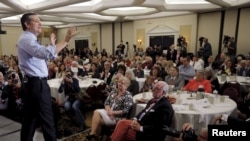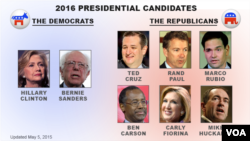So what is going to decide next year’s election, the economy or foreign policy? Which will have a greater impact on voters - the unemployment rate or the fate of the Islamic State?
The next U.S. presidential election is still more than 17 months away but candidates and political experts are already busy trying to figure out which issues will matter most to voters in 2016.
The economy is usually the top issue in any given election year and Democratic pollster Celinda Lake predicted that will likely be the case once again in the 2016 presidential campaign. “Americans are still remarkably pessimistic about the economy despite the months of job growth and Americans have shifted from being concerned about whether or not you can get a job to how much those jobs pay and whether those jobs are full time and whether your kids can get one of those jobs,” Lake said.
Pitching to the middle class
For years, Lake and Republican pollster Ed Goeas have worked together on the George Washington University Battleground Poll, a survey that looks at voter attitudes about issues and candidates during a presidential election cycle.
Goeas agreed the economy will be a top issue next year and said whichever party targets middle class support will prevail. “What I do see with the middle class is a developing feeling out there that the rich get the special programs, the poor get the benefits and the middle class get the bill. And that is where they are really feeling this squeeze that they are the ones that are the least connected and least paid attention to out of Washington,” Goeas said.
Foreign policy a growing concern
The Battleground Poll found 23 percent of those surveyed said the economy was their top priority, followed by 14 percent who mentioned jobs.
Foreign threats came in third at 12 percent but Goeas said the results to one question in particular struck him as significant. “Do you think anyone in your immediate family will be the target of a terrorist attack? And we basically had 39 percent saying yes, that we believe they are worried either very or somewhat. You had another 34 percent saying they are not too worried. But it is still there in that psyche of the public,” he said.
Democrat Lake acknowledged the fears about national security are real in the survey. But she predicted that the economy and jobs will be foremost on the minds of voters when the election is held in November of next year. “The question on the table may be whether this is going to be a foreign policy election and right now the answer appears to be no. But things could change. People are worried about a terrorist attack.”
The Battleground poll found Republicans have an edge over Democrats on foreign policy issues at the moment by a margin of 50 to 40 percent.
Republicans also have an advantage on handling the economy by a margin of 49 to 44 percent. And in another danger sign for Democrats, 65 percent in the Battleground poll said they thought the country was headed on the wrong track, which could give Republicans an added advantage next year if they present themselves as agents of change after eight years of Barack Obama in the White House.
Demand for change
Both pollsters said that while the public appears to be in a mood to demand change in next year’s election, they found voters most interested in finding a presidential candidate who is “effective at getting things done in Washington” as opposed to someone “whose [political] views closely match their own.”
Republican Goeas believes that favors his party next year because the electorate will be looking for change after eight years of the Obama administration.
Not surprisingly, Democrat Lake argued that Hillary Clinton is especially well positioned to address the economic anxieties evident in the Battleground poll and that she will benefit from voters looking for an effective leader to get the country back on track.






